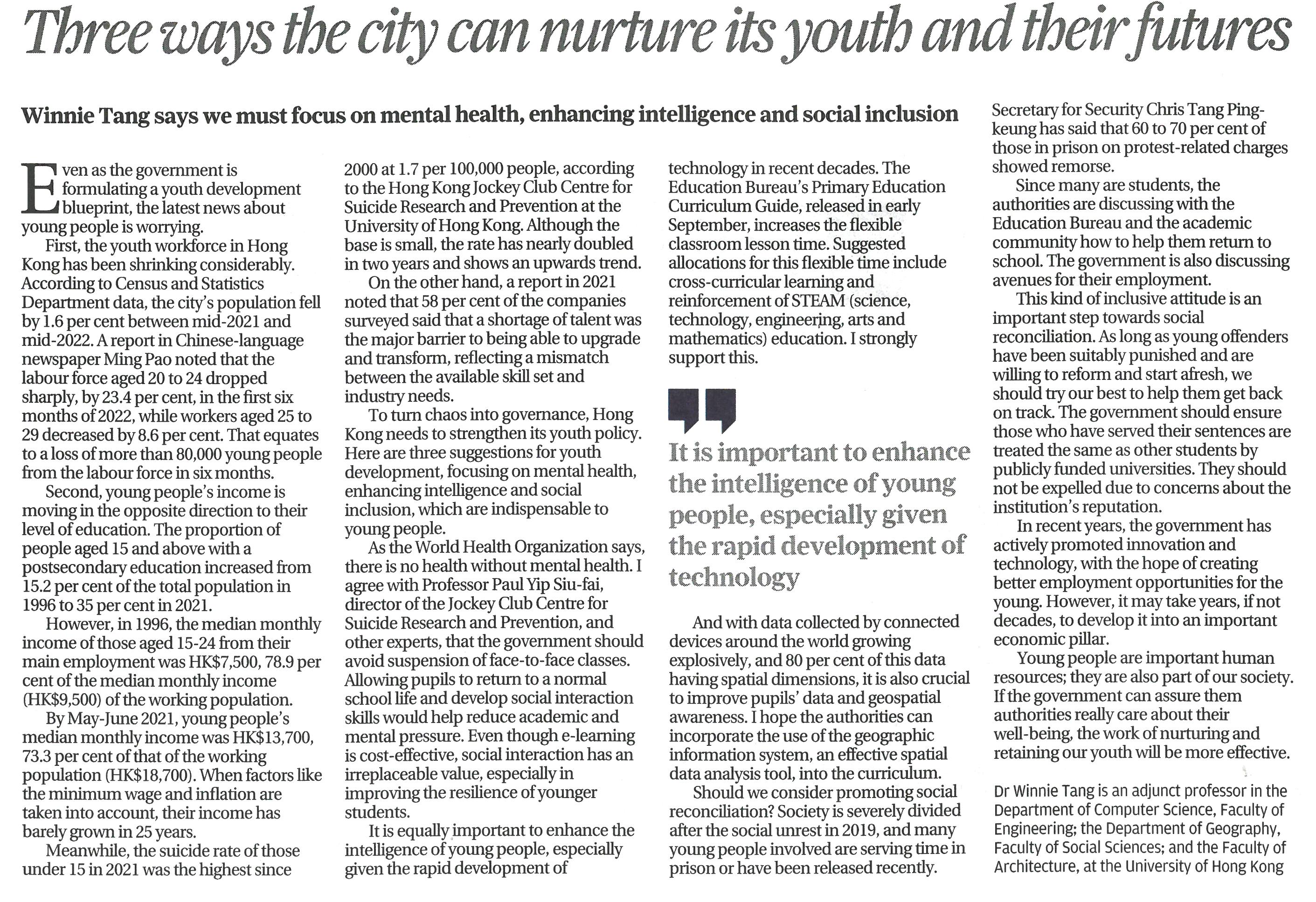網上版請按此

Three ways the city can nurture its youth and their future
Even as the government is formulating a youth development blueprint, the latest news about young people is worrying.
First, the youth workforce in Hong Kong has been shrinking considerably. According to Census and Statistics Department data, the city's population fell by 1.6 per cent between mid-2021 and mid-2022. A report in Chinese-language newspaper Ming Pao noted that the labour force aged 20 to 24 dropped sharply, by 23.4 per cent, in the first six months of 2022, while workers aged 25 to 29 decreased by 8.6 per cent. That equates to a loss of more than 80,000 young people from the labour force in six months.
Second, young people's income is moving in the opposite direction to their level of education. The proportion of people aged 15 and above with a postsecondary education increased from 15.2 per cent of the total population in 1996 to 35 per cent in 2021.
However, in 1996, the median monthly income of those aged 15-24 from their main employment was HK$7,500, 78.9 per cent of the median monthly income (HK$9,500) of the working population.
By May-June 2021, young people's median monthly income was HK$13,700, 73.3 per cent of that of the working population (HK$18,700), a drop of 5.6 percentage points. When factors like the minimum wage and inflation are taken into account, their income has barely grown in 25 years.
Meanwhile, the suicide rate of those under 15 in 2021 was the highest since 2000 at 1.7 per 100,000 people, according to the Hong Kong Jockey Club Centre for Suicide Research and Prevention at the University of Hong Kong. Although the base is small, the rate has nearly doubled in two years and shows an upward trend.
On the other hand, a report in 2021 noted that 58 per cent of the companies surveyed said that a shortage of talent was the major barrier to being able to upgrade and transform, reflecting a mismatch between the available skill set and industry needs.
To turn chaos into governance, Hong Kong needs to strengthen its youth policy. Here are three suggestions for youth development, focusing on mental health, enhancing intelligence and social inclusion, which are indispensable to young people.
As the World Health Organization says, there is no health without mental health. I agree with Professor Paul Yip Siu-fai, director of the Jockey Club Centre for Suicide Research and Prevention, and other experts, that the government should avoid suspension of face-to-face classes. Allowing pupils to return to a normal school life and develop social interaction skills would help reduce academic and mental pressure.
Even though e-learning is cost-effective and means children can avoid a tiring journey to and from school every day, social interaction has an irreplaceable value, especially in improving the resilience of younger students.
It is equally important to enhance the intelligence of young people, especially given the rapid development of technology in recent decades. The Education Bureau's Primary Education Curriculum Guide, released in early September, increases the flexible classroom lesson time. Suggested allocations for this flexible time include cross-curricular learning and reinforcement of STEAM (science, technology, engineering, arts and mathematics) education. I strongly support this.
And with data collected by connected devices around the world growing explosively, and 80 per cent of this data having spatial dimensions, it is also crucial to improve pupils' data and geospatial awareness.
I hope the authorities can incorporate the use of the geographic information system (GIS), an effective spatial data analysis tool, into the regular curriculum to improve young people' problem-solving ability and broaden their geospatial understanding.
Should we consider promoting social reconciliation? Society is severely divided after the social unrest in 2019, and many young people involved are serving time in prison or have been released recently. Secretary for Security Chris Tang Ping-keung has said that 60 to 70 per cent of those in prison on protest-related charges showed remorse.
Since many are students, the authorities are discussing with the Education Bureau and the academic community how to help them return to school. The government is also discussing avenues for employment of these young people after they are released.
This kind of inclusive attitude is an important step towards social reconciliation. As long as the young offenders have been suitably punished and are willing to reform and start afresh, we should try our best to help them get back on track, so they can also contribute to society.
Furthermore, the government should ensure that those who have served their sentences are treated the same as other students by publicly funded universities. They should not be expelled due to concerns about the institution's reputation.
n recent years, the government has actively promoted innovation and technology, with the hope of creating better employment opportunities for the younger generation. However, it may take years, if not decades, to develop it into an important economic pillar like finance and logistics, which employ hundreds of thousands of people.
Young people are important human resources, they are also part of our society. If the government can assure them that authorities really care about their well-being, the work of nurturing and retaining our youth will be more effective.
Dr. Winnie Tang
Adjunct Professor, Department of Computer Science, Faculty of Engineering; Department of Geography, Faculty of Social Sciences; and Faculty of Architecture, The University of Hong Kong